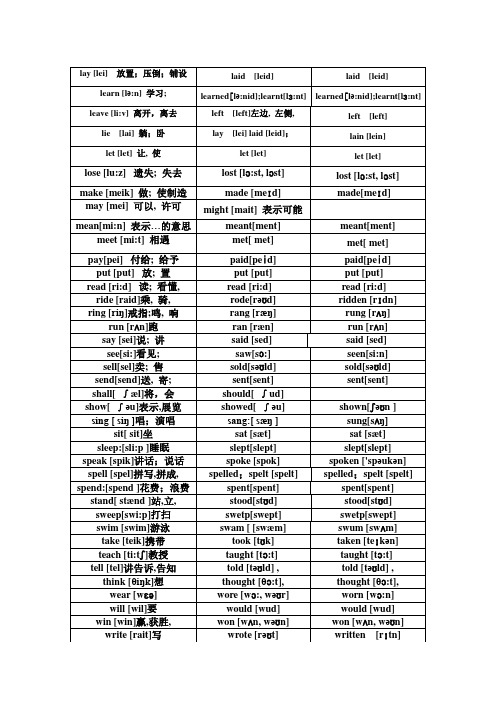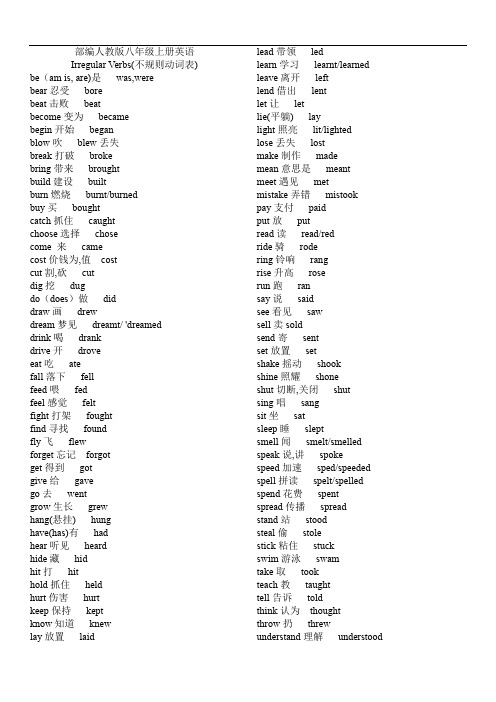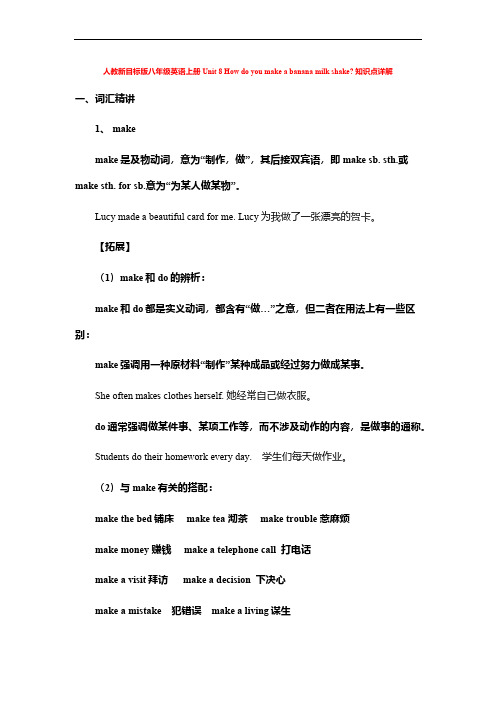八年级上动词(英文)
八年级动词短语

八年级动词短语八年级动词短语导语:想要学好八年级英语,背好动词短语十分重要,下面店铺为大家带来八年级动词短语,欢迎大家记忆背诵!Unit1 Where did you go on vacation?1. go on vacation 去度假2.stay at home 待在家里3.go to the mountains 去爬山4. go to the beach 去海滩5. visit museums 参观博物馆6. go to summer camp 去参加夏令营7.quite a few 相当多8.study for 为……而学习9.go out 出去10.most of the time 大部分时间11. taste good 尝起来很好吃12.have a good time 玩得高兴Xk b 1.C om13. of course 当然14.feel like 给……的感觉;感受到15.go shopping 去购物16.in the past 在过去17. walk around 四处走走18. because of 因为19. one bowl of… 一碗……20. the next day 第二天21. drink tea 喝茶22. find out 找出; 查明23. go on 继续24.take photos 照相25. something important 重要的事26. up and down 上上下下27. come up 出来28. buy sth. for sb. / buy sb. sth. 为某人买某物29. taste + adj. 尝起来……30. look+adj. 看起来……31.nothing…but+动词原形除了……之外什么都没有32.seem+(to be)+ adj. 看起来……33. arrive in+大地点 / arrive at+小地点到达某地34.decide to do sth. 决定去做某事35. try doing sth. 尝试做某事 /36. try to do sth. 尽力去做某事37. forget doing sth. 忘记做过某事/38. forget to do sth. 忘记做某事39. enjoy doing sth. 喜欢做某事40. want to do sth. 想去做某事41. start doing sth. 开始做某事42. stop doing sth. 停止做某事43. dislike doing sth. 不喜欢做某事44. keep doing sth. 继续做某事45. Why not do. sth.? 为什么不做……呢?46. so+adj.+that+从句如此……以至于……47. tell sb. (not) to do sth. 告诉某人(不要)做某事Unit2 How often do you exercise?1 help with housework 帮助做家务2 on weekends 在周末3 how often 多久一次4 hardly ever 几乎从不5 once a week 每周一次6 twice a month 每月两次7 every day 每天8 be free 有空 ww w 9 go to the movies 去看电影10 use the Internet 用互联网11 swing dance 摇摆舞12 play tennis 打网球13 stay up late 熬夜;睡得很晚14 at least 至少15 have dance and piano lessons 上舞蹈课和钢琴课16 go to bed early 早点睡觉17 play sports 进行体育活动18 be good for 对……有好处19 go camping 去野营20 not…at all 一点儿也不……21 in one’s free time 在某人的业余时间22 the most popular 最受欢迎的23 such as 比如;诸如24 old habits die hard 积习难改25 go to the dentist 去看牙医26 morn than 多于;超过27 less than 少于28 help sb. with sth. 帮助某人做某事29 How about…? ......怎么样?/ ……好不好?30 want sb. to do sth. 想让某人做某事31 How many+可数名词复数+一般疑问句? ……有多少……?32 主语+find+that从句. ……发现……33 spend time with sb. 和某人一起度过时光34 It’s+ adj.+ to do sth. 做某事的……的。
不规则动词表(八年级上册)

laid[leid]
laid[leid]
learn[lə:n]学习;
learned[lə:nid];learnt[lɜ:nt]
learned[lə:nid];learnt[lɜ:nt]
leave[li:v]离开,离去
left[left]左边,左侧,
left[left]
sing [ siŋ ]唱;演唱
sang:[ sæŋ ]
sung[sʌŋ]
sit[ sit]坐
sat [sæt]
sat [sæt]
sleep:[sli:p ]睡眠
slept[slept]
slept[slept]
speak [spik]讲话;说话
spoke [spok]
spoken ['spəukən]
read[ri:d]读;看懂,
read[ri:d]
read[ri:d]
ride[raid]乘,骑,
rode[rəʊd]
ridden[rɪdn]
ring[riŋ]戒指;
run[rʌn]跑
ran[ræn]
run[rʌn]
say[sei]说;讲
said[sed]
said[sed]
lie[lai]躺;卧
lay[lei]laid[leid];
lain[lein]
let[let]让,使
let[let]
let[let]
lose[lu:z]遗失;失去
lost[lɔ:st, lɔst]
lost[lɔ:st, lɔst]
make[meik]做;使制造
made[meɪd]
made[meɪd]
told[təʊld],
部编人教版八年级上册英语Irregular Verbs(不规则动词表)

部编人教版八年级上册英语Irregular Verbs(不规则动词表) be(am is, are)是was,werebear忍受borebeat击败beatbecome变为becamebegin开始beganblow吹blew丢失break打破brokebring带来broughtbuild建设builtburn燃烧burnt/burnedbuy买boughtcatch抓住caughtchoose选择chosecome 来camecost价钱为,值costcut割,砍cutdig挖dugdo(does)做diddraw画drewdream梦见dreamt/ 'dreameddrink喝drankdrive开droveeat吃atefall落下fellfeed喂fedfeel感觉feltfight打架foughtfind寻找foundfly飞flewforget忘记forgotget得到gotgive给gavego去wentgrow生长grewhang(悬挂) hunghave(has)有hadhear听见heardhide藏hidhit打hithold抓住heldhurt伤害hurtkeep保持keptknow知道knewlay放置laid lead带领ledlearn学习learnt/learned leave离开leftlend借出lentlet让letlie(平躺) laylight照亮lit/lightedlose丢失lostmake制作mademean意思是meantmeet遇见metmistake弄错mistookpay支付paidput放putread读read/redride骑rodering铃响rangrise升高roserun跑ransay说saidsee看见sawsell卖soldsend寄sentset放置setshake摇动shookshine照耀shoneshut切断,关闭shutsing唱sangsit坐satsleep睡sleptsmell闻smelt/smelled speak说,讲spokespeed加速sped/speeded spell拼读spelt/spelled spend花费spentspread传播spreadstand站stoodsteal偷stolestick粘住stuckswim游泳swamtake取tookteach教taughttell告诉toldthink认为thoughtthrow扔threw understand理解understoodwake醒woke wear穿wore win赢won write写wrote。
人教版英语八年级上册动词不定式讲解,专项练习(附答案)

初中英语语法(动词不定式)1.不定式的基本形式与结构动词不定式指通常由to加上动词原形(如to write) 所构成的一种非限定性动词形式,但在有些情况下to可以省略。
动词不定式有进行体和完成体(如上to be writing,to have written),也有被动态(如to be written),所有的主动词,不论是及物动词还是不及物动词,也不论是动作动词还是状态动词,都有不定式形式。
助动词除be和have外,没有不定式形式。
动词不定式在语法功能上可作主语、宾语、表语、定语和状语。
2.不定式的用法1)不定式结构作主语1.Te get contact with his family in Taiwan made him extremely happy since they separated more than 40 years ago.2.To finish that task in such a short time is really a challenge.在上述情况下,如果不定式较长,显得头重脚轻,则可由代词让作形式主语(形式主语it不可由that或this等其他代词代替),而将不定式放到后面。
如:1.It made him extremely happy to get contact with his family in Taiwan since they separated more than 40 years ago.2.John admitted that it is always difficult for him to be on time.不定式结构所表示的动作是谁做的,即不定式的逻辑主语,通常可以通过for sb. to do sth. 结构表达:1.It is quite important for us to read good books during a general review.2.It is not difficult fot those talented students to pass the exam.在某些形容词(如careless,clever,considerate,foolish,good,impolite,kind,naughty,nice,silly,stupid等)作表语时,不定式后可以加of来引导出其逻辑主语:1.It is very kind of you to tell me the truth.2.It is stupid of him to do such a silly thing.2)不定式作宾语不定式作宾语有两种:一种是及物动词后直接跟带to的不定式,另一种是“及物动词+疑问词+带to的不定式。
译林版英语八年级上册谓语动词表

译林版英语八年级上册谓语动词表本文档旨在整理译林版英语八年级上册中出现的谓语动词,帮助学生更好地掌握和运用这些动词。
一、一般动词1. play - 玩耍、打球2. study - 研究、研究3. eat - 吃4. drink - 喝5. sleep - 睡觉6. run - 跑步7. walk - 散步、走路8. swim - 游泳9. read - 阅读10. write - 写作11. speak - 说话、讲话12. listen - 听13. watch - 观看14. draw - 画画15. sing - 唱歌16. dance - 跳舞17. jump - 跳跃18. climb - 攀爬19. drive - 开车20. ride - 骑(自行车、马等)二、状态动词1. be - 是、存在2. have - 拥有、有3. like - 喜欢4. love - 爱5. hate - 讨厌、憎恶6. want - 想要、希望7. need - 需要8. prefer - 更喜欢、宁愿10. feel - 感觉11. seem - 似乎、好像12. appear - 出现、显得13. sound - 听起来14. taste - 尝起来15. smell - 闻起来三、助动词1. can - 能够、可以2. could - 可以、能够(过去式)3. will - 将要、会4. would - 将、想要5. may - 可能、也许6. might - 可能、也许(过去式)7. shall - 将要、应该8. should - 应该、应当9. must - 必须10. ought to - 应该、应当11. need to - 需要以上是译林版英语八年级上册中常见的谓语动词,希望对学生们的学习有所帮助。
人教版英语八年级上册08动词不定式(基础讲解)

动词不定式【概念引入】1. 动词不定式名言:(1)动词不定式作表语To lose is to learn. 失败就是学习。
(2)动词不定式作主语It is better to give than to take. 给予比接受更好。
(3)不定式作宾语Expect to be treated as you have treated others.你怎样待别人,就指望别人怎样待你。
(4)不定式作宾补Adversity causes some men to break,others to break records.逆境使一些人崩溃,也使一些人破记录。
(5)不定式作定语There is a time to talk and a time to act.该说的时候说,该做的时候做。
(6)不定式作目的状语To find the exact answer,one must first ask the exact question.要找到确切的答案,首先必须提出确切的问题。
2. 动词不定式定义:动词不定式是一种非谓语形式(不能作谓语),基本形式是to do形式(to是不定式符号的标志,无意义,可以不翻译)肯定式:to + 动词原形否定式:not to + 动词原形【用法讲解】1.动词不定式的特征动词不定动式是一种非谓语动词形式,它没有人称和数的变化,在句子中不能作谓语,但可以作除谓语之外的其它任何句子成分(主语、表语、宾语、宾语补足语、定语和状语);动词不定式具有名词、形容词和副词的特征,同时还保持动词的某些特点,既可以有自己的宾语和状语,动词不定式和它的宾语和状语构成不定式短语。
2. 动词不定式在句子中的作用动词不定式是由to+动词原形构成,在句中起名词,形容词和副词的作用,可以担任除谓语以外的其它任何成分。
(1)动词不定式作主语。
例如:To master a language is not an easy thing.掌握一门语言不是一件容易的事情。
人教新目标版八年级英语上册Unit 8 How do you make a banana milk shake 知识点详解

人教新目标版八年级英语上册Unit 8 How do you make a banana milk shake? 知识点详解一、词汇精讲1、 makemake是及物动词,意为“制作,做”,其后接双宾语,即make sb. sth.或make sth. for sb.意为“为某人做某物”。
Lucy made a beautiful card for me. Lucy为我做了一张漂亮的贺卡。
【拓展】(1)make和do的辨析:make和do都是实义动词,都含有“做…”之意,但二者在用法上有一些区别:make强调用一种原材料“制作”某种成品或经过努力做成某事。
She often makes clothes herself. 她经常自己做衣服。
do通常强调做某件事、某项工作等,而不涉及动作的内容,是做事的通称。
Students do their homework every day. 学生们每天做作业。
(2)与make有关的搭配:make the bed铺床 make tea 沏茶 make trouble 惹麻烦make money 赚钱 make a telephone call 打电话make a visit拜访 make a decision 下决心make a mistake 犯错误 make a living谋生make a noise制造噪音 make sure 务必2、 turn onturn on是动副短语,意为“打开”,反义词为turn off,意为“关闭”。
Please turn on the radio. 请打开收音机。
Please turn off the light. 请关灯。
【拓展】(1)在英语中,由“动词+副词”构成的短语动词的宾语如果是代词,只能放在动词与副词之间;如果是名词,既可以放在它们之间,也可以放在副词之后。
turn与off、on、up、down、over搭配均是动副结构。
八年级上册英语语法《情态动词can与could的用法》知识点

can与could的用法一、表示能力(1) 表示现在的能力,用can:My sister can drive. 我妹妹会开车。
Everyone here can speak English. 这儿人人会说英语。
(2) 表示将来的能力,通常不用can或could,而用be able to的将来时态:I’ll be able to speak French in another few months. 再过几个月我就会讲法语了。
One day people will be able to go to the moon on holiday. 总有一天人们可以到月球上去度假。
但是,若表示现在决定将来是否有能力做某事,则可用can:Can you come to the party tomorrow? 你明天能来参加我们的聚会吗?(3) 表示过去的能力,有时可用could,有时不能用could,具体应注意以下几点:①若表示过去一般的能力(即想做某事就随时可做某事的能力),可用could:Could you speak English then? 那时候你会说英语吗?②若表示过去的特定能力(即在过去特定场合做某事的能力),则不能用could,而用was (were) able to do sth,或用managed to do sth,或用succeeded in doing sth 等。
He studied hard and was able to pass the exam. 他学习很努力,所以考试能及格。
At last he succeeded in solving the problem. 他终于把那个问题解决了。
【注】could 不用来表示过去特定能力通常只限于肯定句,否定句或疑问句中,它则可以表示过去特定的能力:I managed to find the street, but I couldn’t find her house. 我想法找到了那条街,但没找到她的房子。
